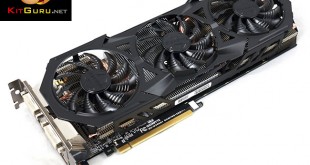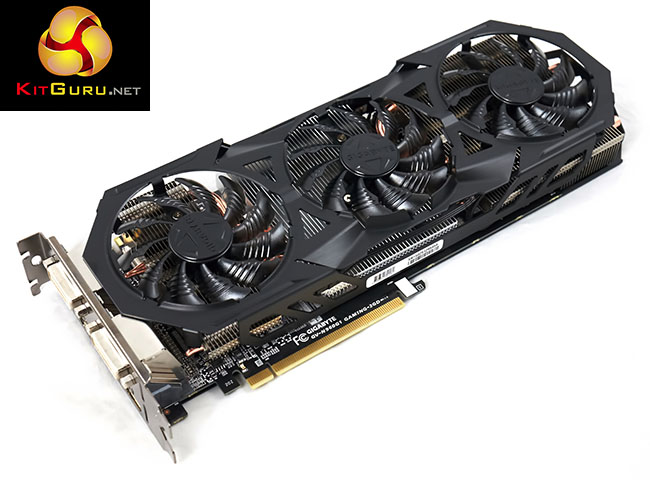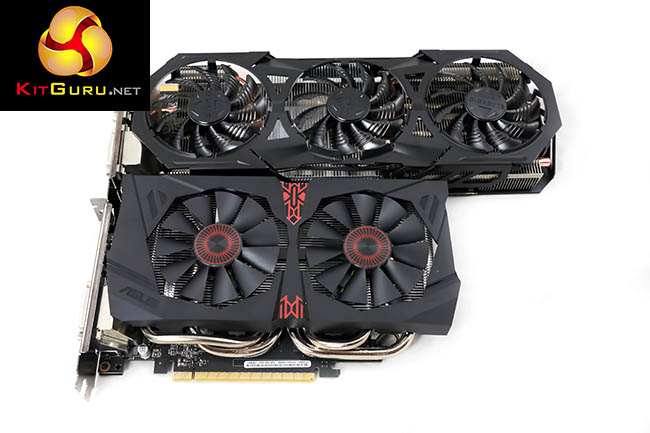
It was almost a year ago when Nvidia released their first graphics card based on the Maxwell architecture. My reviews of the GTX750Ti were positive – Maxwell delivered excellent full HD performance while taking all the power it needed direct from the PCIe slot. I said back in February 2014 that future high end Nvidia GPU's would likely lead the way – and as the year came to a close I was proved correct. The GTX970 and GTX980 won multiple awards on KitGuru. Nvidia's Maxwell architecture also walked away with our Excellence in Technology Award for 2014. 2015 is a new year and with the GTX960 being released this week, can Nvidia possibly do it again?

The Gigabyte GTX960 G1 Gaming is a monster solution – a dual slot, triple fan card featuring several thick heat pipes running across the length of the PCB. The image below shows the G1 Gaming beside the other card we review today, the Asus GTX960 Strix OC Edition. Quite a difference in size.

Nvidia say the GTX960 is one of the most power efficient high performance gaming cards, and with a quoted TDP of 120 watts it seems in line with what we would expect from the Maxwell architecture. The GTX960 will surely appeal to a wide audience – on paper it should be noticeably more powerful than the GTX750ti, while shipping below the £200 ‘sweet spot'.
How does the technology behind the GTX960 stack up?
| GPU | GeForce GTX 750ti (Maxwell) | GeForce GTX 960 (Maxwell) | Geforce GTX 970 (Maxwell) | GeForce GTX 980 (Maxwell) |
| Streaming Multiprocessors | 5 | 8 | 13 | 16 |
| CUDA Cores | 640 | 1024 | 1664 | 2048 |
| Base Clock | 1020 mhz | 1126 mhz | 1050 mhz | 1126 mhz |
| GPU Boost Clock | 1085 mhz | 1178 mhz | 1178 mhz | 1216 mhz |
| Total Video memory | 2GB | 2GB | 4GB | 4GB |
| Texel fill-rate | 40.8 Gigatexels/Sec | 72.1 Gigatexels/Sec | 109.2 Gigatexels/Sec | 144.1 Gigatexels/Sec |
| Memory Clock | 5400 mhz | 7010 mhz | 7000 mhz | 7000 mhz |
| Memory Bandwidth | 86.4 GB/sec | 112.16 GB/sec | 224 GB/s | 224 GB/sec |
| Bus Width | 128bit | 128bit | 256bit | 256bit |
| ROPs | 16 | 32 | 64 | 64 |
| Manufacturing Process | 28nm | 28nm | 28nm | 28nm |
| TDP | 60 watts | 120 watts | 145 watts | 165 watts |
Nvidia's GTX960 GM206 ships with 1,024 CUDA cores – significantly more than the 640 CUDA cores available on the GTX750ti, but half the amount featured on the flagship GTX980 (2,048).
A bone of contention within the enthusiast audience will be the somewhat limited 128bit memory interface – identical to the GTX750ti. Nvidia are keen to point out however that the Maxwell memory architecture is approximately 33% more efficient than Kepler. We do delve into this a little deeper on the architecture page later in the review.
The reference clock speeds are set at 1,126mhz (1,178mhz boost), with 32 ROPs and 64 texture units. GIGABYTE have tweaked their G1 Gaming to 1,241mhz (1,304 mhz boost) with 2GB of GDDR5 memory running at 1,.753 mhz (7Gbps effective).
 KitGuru KitGuru.net – Tech News | Hardware News | Hardware Reviews | IOS | Mobile | Gaming | Graphics Cards
KitGuru KitGuru.net – Tech News | Hardware News | Hardware Reviews | IOS | Mobile | Gaming | Graphics Cards



How did you guys manage to not compare it to it’s bigger brother – the GTX 970 G1? How does the 960 compare to the current generation of cards? What about 960 SLI?
From the power page “This card consumes more power than the Asus GTX960 Strix OC”. I believe as you don’t show that, I like others are confused thinking you mean the 750 Stix that’s shown. Perhaps clarify by saying “from the previous article” or put it’s results in the graph.
Given that Sapphire Dual X (965 Mhz) while high out-the-box, it’s a fairly “midland” construction, especially with Gigabyte G1 pushing the envelope with 1,304 Mhz Boost (the upper 25% of what GM206 customs) and 3 fans. I thought that Sapphire 285 held up very well. Even power while gaming here appears much different than other reviews only besting the 285 by 15% (stock vs. stock). Noise and cooling given that cooler/fans and lower power, didn’t strike me as significantly distinguishing.
Seeing that R9 285’s have gotten down into the $180’s (with rebate even lower,) this for a $230… I don’t see it. Nvidia didn’t offer much in marching the $200-1080p market forward, even to the point 285’s prices seem on the rebound.
When does GTX 965 comes out? Anyone knows?